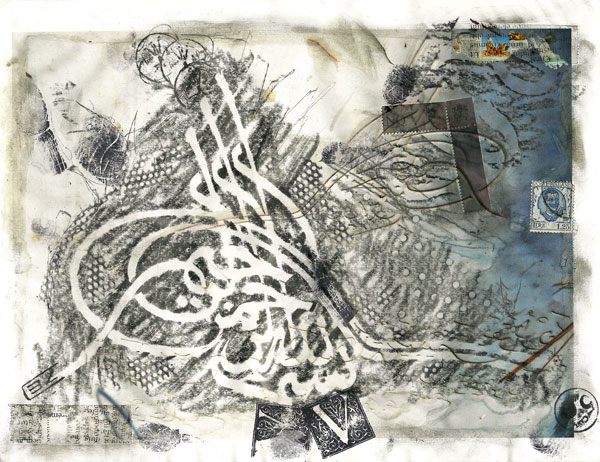Blake Butler
http://www.gillesdeleuzecommittedsuicideandsowilldrphil.com/
Blake Butler lives in Atlanta. His third book, There Is No Year, is forthcoming April 2011 from Harper Perennial.
http://www.gillesdeleuzecommittedsuicideandsowilldrphil.com/
Blake Butler lives in Atlanta. His third book, There Is No Year, is forthcoming April 2011 from Harper Perennial.
Derek White is selling some amazing rubbings/collages he made while in Rome, herein administered among ruminations on the city and Thomas Pynchon’s V..


[In continuing from my Important Books of the 00s list, which mostly intentionally swerved poetry in manner of context, the excellent and esteemable Brian Foley of Brave Men Press, Sir!, and many other objects has kindly and genuinely sent over his list of poetry-only 00s, which I am extremely stoked about. Enjoy! — BB]
At the beginning of this decade, I would not have thought I would have anything to say about poetry by its end. I was a bloated necktie who combed his hair. I was lonely. I had no dog to feed. Now there are too many dogs begging at my door, too much loneliness.
There is no universal to this list. The reality is mine, it is biographical. But I am happy to share it. I appreciate the opportunity to make this list, if for nothing else but to ruminate over what I have ruminated over. It was fun. If this list seems a little tipped toward the end of the decade, its because that’s when I began, what I consider, “reading seriously.” Though its arguable that its also when something had been passed between hands in the night and poetry once more became very interesting.
Kassia Kroser spits some logic about the frenzy for “what’s next?! what’s new?!”): ‘The Unicorn Will Not Save Publishing‘ @ Booksquare. The solution? “Saving publishing is the job of publishers. No one thing will save publishing. Lots of little things will save publishing.” [Thanks Matt Bell.]
New this week from Action Books, another important and blood-baked translation, a sublime meld of grotesque and giddy, which takes its mistakably blunt (and therefore, reversely compelling, and then compelling) title in reference to the author’s actual daughter, Kanoko:
Killing Kanoko
by Hiromi Ito (translated by Jeffrey Angles)
$12I want to get rid of Kanoko
I want to get rid of filthy little Kanoko
I want to get rid of or kill Kanoko who bites off my nipples.
“KILLING KANOKO is a powerful, long-overdue collection (in finetranslation) of poetry from the radical Japanese feminist poet, HiromiIto. Her poems reverberate with sexual candor, the exigencies anddelights of the paradoxically restless/rooted female body, and the visceral imagery of childbirth leap off the page as performative modal structures–fierce, witty, and vibrant. Hiromi is a true sister of the Beats.”-Anne Waldman
Some poems:
“Father’s Uterus, Or The Map” on Action Yes.
“Harakiri” on Nerve.
Once again, Action Books delivers a much needed translation of a major foreign poet, getting these English versions into our bodies.
BOOKS by
Diane Ackerman, Paul Auster, Nicholson Baker, Charles Baxter, Gabrielle Bell, Richard Brautigan, Robert Olen Butler, Thomas Frank, Neil Gaiman, Jaime Hernandez, Steve Martin, Harry Mathews, Lorrie Moore, John Porcellino, Edward Sanders, Gertrude Stein, Dara Wier, David Wroblewski, Adam Zagajewski
BROADSIDES, CHAPBOOKS, and SPECIAL ITEMS by
M.T. Anderson, Jan Brett, Stephen Dixon, Russell Edson, Brian Evenson, Robert Hass, Gerard Malanga, Paul Metcalf, Alice Notley, Wang Ping, Donald Revell, Buzz Spector & Marjorie Welish, Nathaniel Tarn, James Tate, Anne Waldman, Keith Waldrop, Rosmarie Waldrop
Nick Ripatrazone brings an in-depth and very excellent close reading and analysis of William Gass’s “The Pedersen Kid” at Quarterly Conversation: “The word snow—and its variations—appears 181 times within the 79 pages of “The Pedersen Kid.” The repetition transfers snow from word to thing: snow is overwhelming and smothering, equal parts plot, character, and theme. The word appears in the second sentence, and it completes the initial thought of the story. It is a Faulknerian convention, a trope in the tradition of adventure novels. Snow is omniscient but transient, gone come spring.”
Johannes Göransson posted an excellent rumination about the Gurlesque on his blog, including considerations of Kenneth Anger, Lara Glenum, Jack Smith, kitsch, and other: “It’s interesting to me how descriptions of kitsch and trash almost always come in lists. Whether it’s Rimbaud’s “Parade,” Walt Whitman, Ginsberg, Clement (and Arielle!) Greenberg: The “poetic crap” (Rimbaud) always come in these long lists. It’s as if there was an implicit notion of montage in the junk. No wonder Dada, Cornell, Rauschenberg etc etc made collages and assemblages out of this excrement. Our idea of kitsch is already as a pile of crap that we have to wade through. It lacks hierarchy or narrative. We have to wade through it. Just a bunch of excrement.”